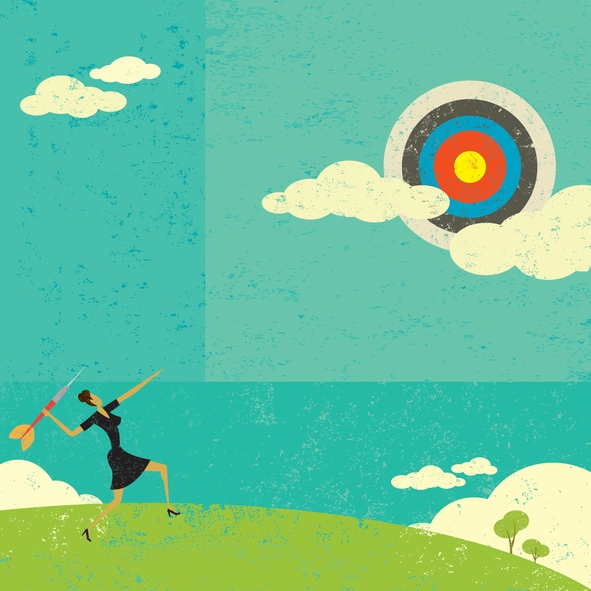You have /5 articles left.
Sign up for a free account or log in.

Istockphoto.com/Retrorocket
Earlier this month, I had the honor of speaking at the Michigan American Council on Education Women’s Network annual conference. The conference leaders asked me to address this year’s theme, Make a Difference: Leading in a Climate of Change.
Preparing for that event gave me a chance to think about the special set of challenges involved in leading when the circumstances are changing around us rapidly and continuously. We want to make changes and sustain them so that we can improve the climate for inclusion and success in higher education. With so many competing needs and priorities, the challenge may seem impossible. But it is not. You are already making a difference for individuals and for your campus community. So, what more can you do? In these times, the key to making a difference is to do what you’re doing now -- with some differences.
Lead and Share
You are already leading and helping others around you make a difference. But are you sharing what you are doing with a larger set of colleagues? We often carry out our work as leaders in a solo manner. Our pattern is to keep focused on engaging those directly around us.
It is more work in the beginning to break that pattern and expand your outreach, but sharing pays off in many ways. You can ask for help and make the efforts easier or richer. You might report your activities to other people to gather feedback and compare notes for improvements. You can also offer to help others or provide this opportunity to someone else on your team.
Either way, the network of those doing the work gets larger. The work gains in quality and credibility as more people know about it. Your growing network can also be a source of support if circumstances shift and your efforts, or those of others in your group, are threatened by new priorities.
Question and Learn
One of the most important activities to practice within your expanded network is the process of listening and learning. We in America are losing the art of asking a question to which we genuinely desire an answer. Too often “questions” are really exclamations -- or even expletives. What were you thinking? What the hell is that?
Letting ourselves fall into that practice is a great danger to our work and our community life. We are losing our capacity to use debate as a tool of inquiry. We ask questions meant only to elicit answers we expect we know, then we respond in ways we have rehearsed.
It is important to ask demanding -- even awkward -- questions among friends with the understanding that we serve each other best with honest answers. With the people outside our circle, it’s probably best that we ask open-ended questions, but again with a manner that promises time and attention to whatever comes tumbling out. We will not make the right differences for the most people unless we keep pushing ourselves to learn as we lead.
Connect and Stretch
Most of us choose to spend most of our time with people we expect will agree with us. Even when we open ourselves to more challenging conversations, it is usually with those who start as sympathetic to our situation. We often hear taunts that our students are “coddled” and need to get out of their comfort zones, but we don’t do much connecting ourselves except in our own comfort zones. I’m not suggesting that we start this process by seeking out people who make a point of attacking higher education. But we do need to be talking with people who would ask questions differently and therefore possibly challenge our answers.
Some communities offer “difficult conversation” programs with announced topics and facilitators. But I’d suggest that you might start with attending events related to other cultures. The differences in those settings do have historical context that can make them charged, but often such community programs offer you the chance to compare notes with other people about seemingly similar experiences that still can open new ways of seeing things.
A while back, I was a part of an international discussion on women in poverty. My African colleagues could not understand why the Americans focused so much on “female-headed households.” Finally, it became clear that the sticking point was that those of us from the United States and Canada saw this group as a large percentage of households in poverty, while in Africa, as one colleague explained, “Most households are in poverty.” I could never think about poverty in quite the same way. Statistics can be helpful, yet they also can blind us to lived experience. If we’re going to make a difference for our students today, we must be alert to the larger portion of those who are living in poverty or supporting family members who are.
Enjoy and Thrive
Finally, it’s important to acknowledge how much most of us enjoy our work. Not all of it, for sure, but more than we show regularly. We see this often during our HERS Institute panels of presidents and provosts. As we discuss the challenges of higher education and the daily conflicts on our campuses, things can get pretty depressing. To shift the atmosphere, I only need to ask the question: “So, why do you go to work every day?” The faces change into big smiles, and the stories pour out: “We go to make a difference. To change people’s lives and their experiences of success on our campuses.”
We need to cultivate that sense of the joy in making a difference, savoring the results of hard work and smart changes. We need to do that to survive each day. But more important, we need to consciously develop our capacity to thrive under challenging conditions over a long period of time. Making the differences we want to make in our communities requires a long-term commitment. There is much to accomplish, and in this climate of change, not everything we do will be supported and implemented as we hope.
So, how do we thrive under these conditions? We have to shift the balance between the anxiety that is draining us and the affirmations that can lift us in difficult circumstances. I use the word "anxiety" because I observe how many of us are carrying around a sense of burden; we always seem to feel we have not done enough. First, we need to recognize the real things we can do -- and then get them done. Second, we need to acknowledge the burden of things that feel beyond our control, and that may well be beyond what we can do now. We can consciously lay them aside and commit to returning later.
Beyond those things, we need to name the anxiety that is coming from a barrage of information that is distracting us and must be ignored. We can put that on our list to revisit, as well, but only after we have filled some of the “anxiety space” with activities that connect us with beauty, peace and wisdom. Those are the deep resources that most of us find in art, nature, physical activity or loving people. Wherever you find them, spend more time there!
You will not win on every project you undertake. But by now you know that you do not need to win in order to succeed. You know how to understand deeply and act on that understanding, alone when you need to and with others when you can. Those activities, over the long term, create the possibilities that matter for you and others that did not exist before. In a climate of change, that is the most important difference you can make.








